Key takeaways:
- Mastering various egg cooking techniques enhances culinary skills and builds confidence in the kitchen.
- Using the right tools, such as a non-stick skillet and a sturdy pot, is essential for successful egg preparation.
- Common challenges include overcooking scrambled eggs and dealing with cracks in boiled eggs; learning tricks like timing and using vinegar can improve results.
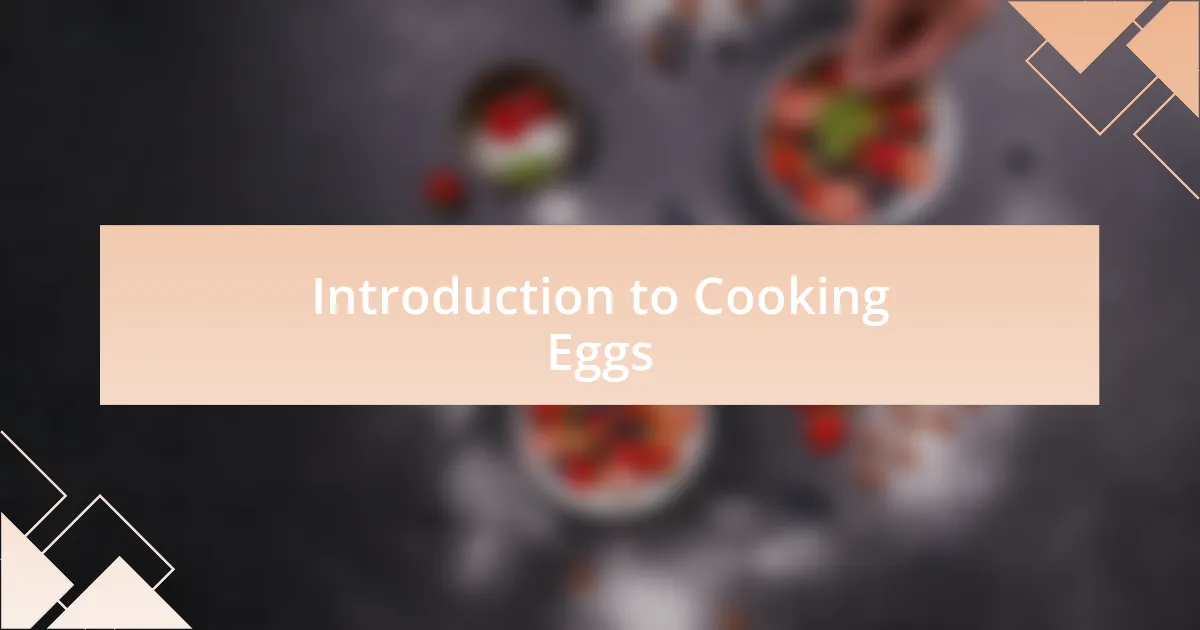
Introduction to Cooking Eggs
Cooking eggs is truly an art form, one that I believe every home cook should master. From the humble scrambled egg to the elegant poached version, each method has its own charm and challenge. I still remember the first time I cracked an egg into a hot pan, excited yet nervous, wondering if today would be the day I’d get it just right.
The beauty of eggs lies not only in their versatility but also in how they can evoke memories. I often think back to weekends spent in my grandmother’s kitchen, her hands expertly flipping omelets while she shared stories from her past. Have you ever had a moment where the smell of cooking eggs took you back to a cherished memory? It’s that connection that makes cooking eggs so special for me.
Different cooking techniques yield distinctly different results, and that’s where the fun begins. For instance, have you ever experimented with soft-boiled eggs, their golden yolks gently oozing over toast? It’s like a little celebration on a plate! I’ve found that mastering these techniques not only elevates a simple meal but also builds confidence in the kitchen. The journey of cooking eggs invites creativity, and I can’t wait to share my secrets with you!
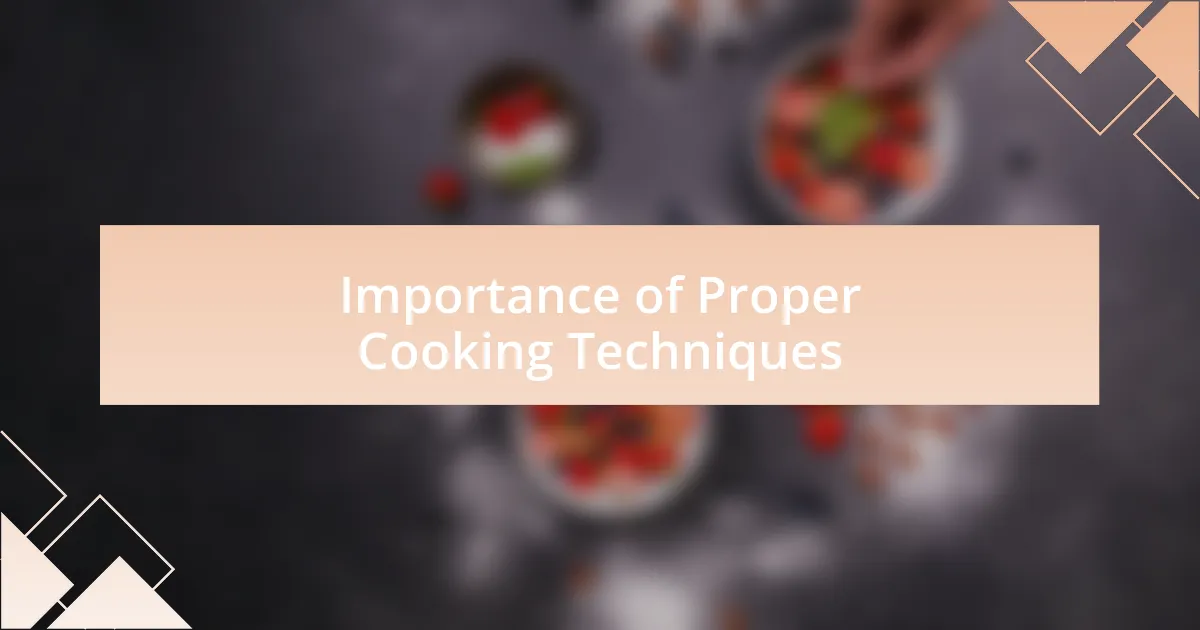
Importance of Proper Cooking Techniques
Understanding the importance of proper cooking techniques is crucial for achieving the perfect egg dish. I remember the first time I attempted to make an egg soufflé. It looked beautiful, but when I cut into it, I realized I hadn’t whipped the egg whites enough. The result was a dense, disappointing mess instead of the light, airy texture I envisioned. It taught me that mastering each technique can directly influence the outcome, and this lesson has stuck with me ever since.
Additionally, precise cooking techniques allow us to bring out the egg’s natural flavors. I often find joy in the process of gently frying an egg sunny-side up, ensuring the whites are set while the yolk remains lush and runny. This method, when done correctly, can transform a simple breakfast into a delightful culinary experience. Doesn’t it make you appreciate the nuances of cooking? Each method requires attention and care, and that’s what truly makes the difference.
Moreover, learning proper techniques builds a strong foundation in culinary skills. I vividly recall my cooking class, where mastering the art of boiling eggs taught me the significance of timing. A mere thirty seconds could change an egg from hard-boiled to crumbly. These moments reveal how extraordinary the everyday act of cooking can be. Isn’t it amazing how a little knowledge can enhance our dishes and lift our cooking confidence?
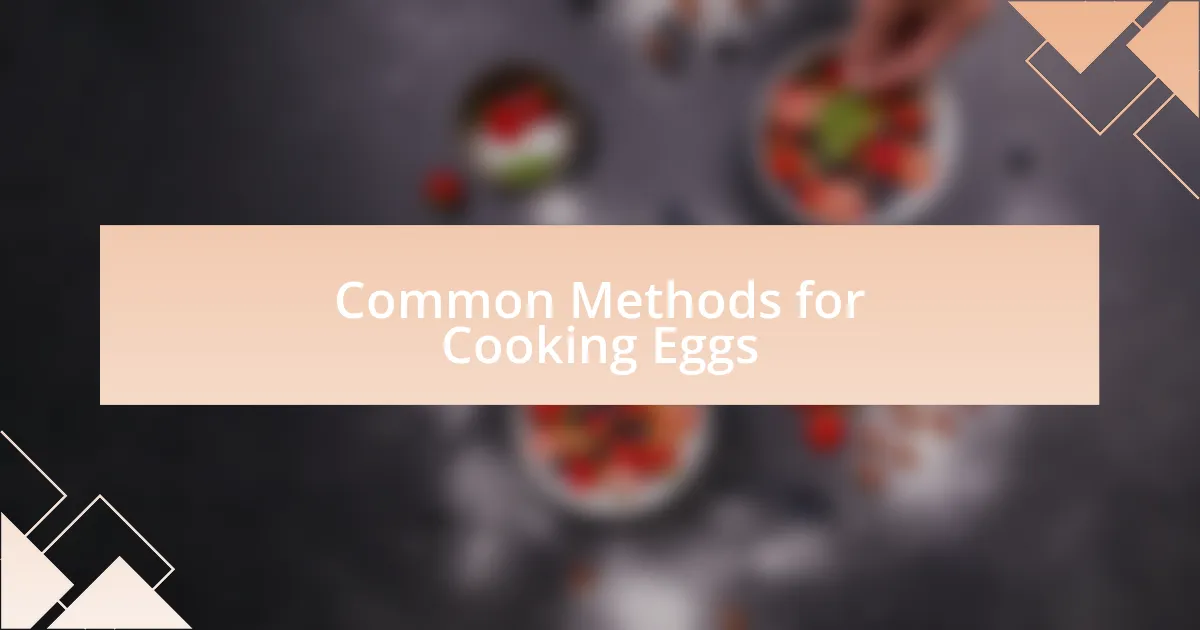
Common Methods for Cooking Eggs
When it comes to cooking eggs, frying is one of the most popular methods. I remember experimenting with different oils and non-stick pans; each time, I learned how the choice of fat could affect not only the flavor but also the egg’s texture. A drizzle of olive oil or a knob of butter can create a delightful crispy edge while keeping the center creamy. Have you ever tried seasoning the oil before adding the egg? It’s a simple trick I use that elevates the dish.
Boiling is another classic technique, and I often found it surprisingly tricky at first. The difference between a perfectly soft-boiled egg with a velvety yolk and a rubbery one is all about timing. I still recall the thrill of discovering the ideal time for a soft-boiled egg; it was a game changer for my brunches! Plunging those eggs into an ice bath post-boil is essential, too. It not only stops the cooking process but helps achieve that perfect peel.
Lastly, poaching is a method that seems intimidating but is incredibly rewarding once you get the hang of it. I used to struggle with achieving that picture-perfect poached egg, often ending up with a cloud of whites. Then one day, I learned the swirl technique—creating a gentle whirlpool in the pot before adding the egg. Now, the sight of a perfectly poached egg makes me feel like I’ve truly mastered a culinary art. Have you dared to try poaching yet? The satisfaction of achieving that runny yolk is worth the journey.
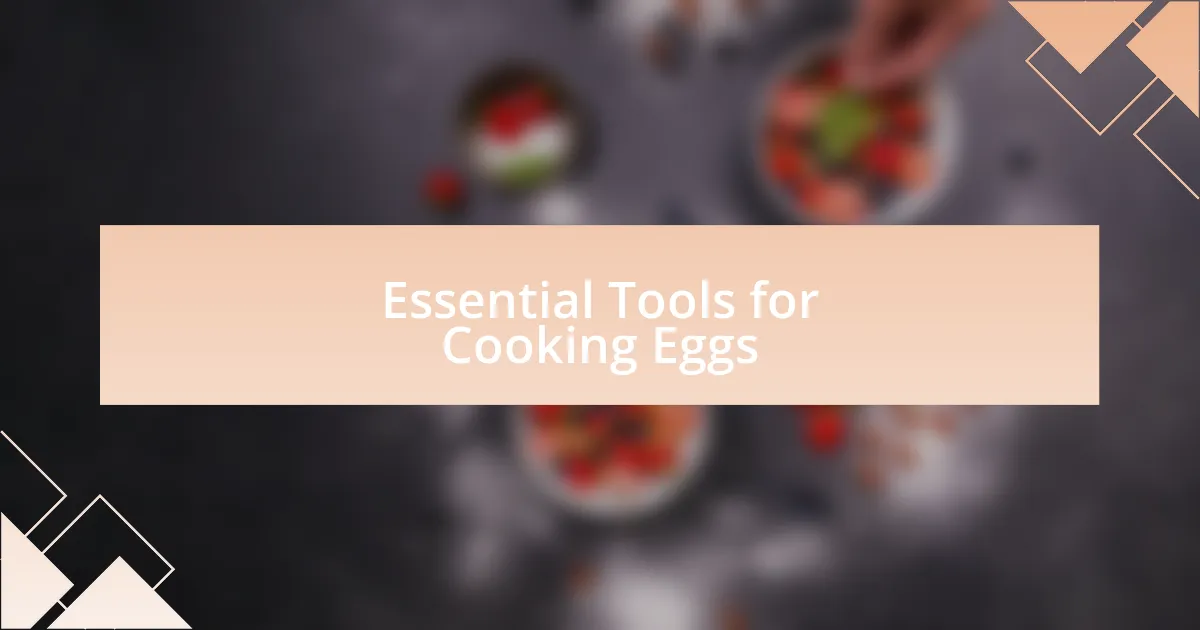
Essential Tools for Cooking Eggs
When it comes to cooking eggs, having the right tools can make all the difference. A reliable non-stick skillet is essential for frying or scrambling eggs to perfection. I still remember the first time I worked with a high-quality non-stick pan; it felt like magic watching the eggs glide effortlessly out of the pan without sticking. It’s certainly true what they say: the right tool can change your cooking experience dramatically.
For boiling eggs, I’ve found that a sturdy pot with a tight-fitting lid is a must. I learned this the hard way after having a pot boil over during my first attempt at hard-boiled eggs. The combination of a well-fitted lid and a gentle simmer not only controls the cooking process but also helps to achieve that ideal, tender white without the dreaded rubbery texture. Have you ever had a similar kitchen mishap? It’s honestly a lesson worth cherishing.
Poaching eggs brings its own set of challenges, but the right equipment can simplify the process. A deep saucepan works wonders, and using a thermometer to keep the water at the right temperature has been invaluable in my kitchen. I didn’t realize how temperature-sensitive poaching could be until I spent an afternoon experimenting with different heat levels. Have you ever felt that rush of excitement when you create a perfect poached egg? It’s those little victories that keep me coming back to the stove.
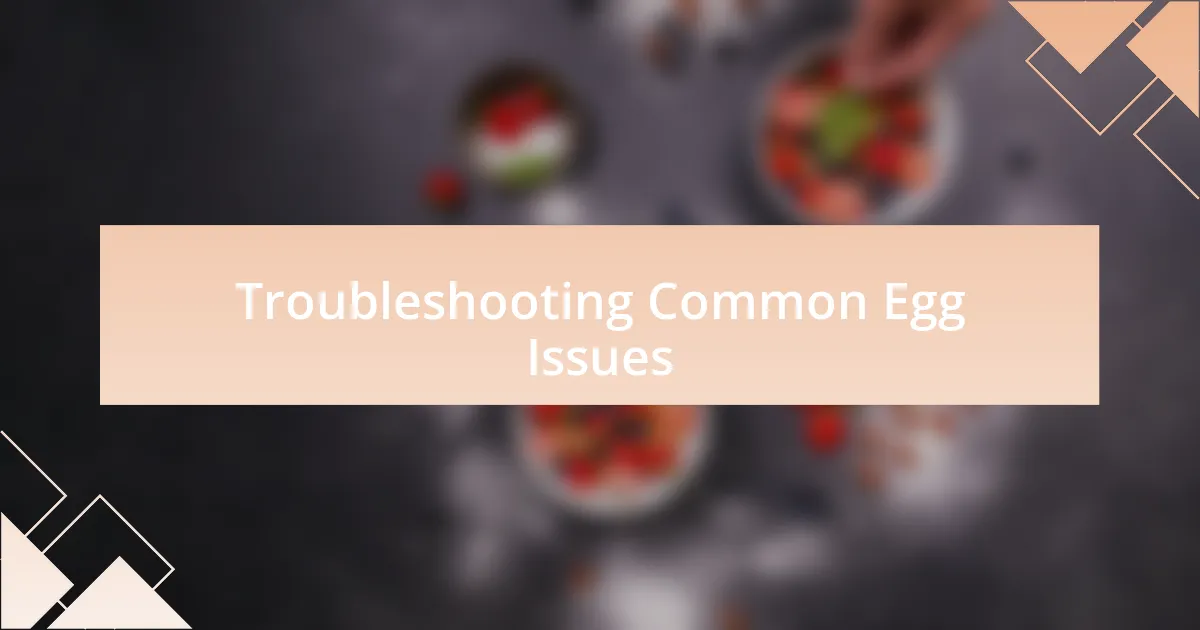
Troubleshooting Common Egg Issues
When you crack an egg, sometimes you might find a watery mess instead of that perfectly fluffy scramble. I’ve encountered this during many rushed breakfasts, only to discover that my eggs were past their prime. Fresh eggs make all the difference; they not only hold together better but also provide that rich flavor we all love. Does the idea of using fresher eggs resonate with your culinary journey?
One issue that often pops up is overcooked scrambled eggs. Believe me, I’ve walked that path more times than I care to admit! The key here is to pull them off the heat just before they look done; residual heat will continue to cook them for a minute or two. It’s a fine line, but learning to trust your instinct can transform a rubbery mess into a creamy delight. Isn’t it incredible how timing can completely change the dish?
Cracks in your boiling eggs might leave you feeling defeated, especially if you’re aiming for that pristine look. I learned a neat trick: adding a splash of vinegar to the water can help hold the egg whites together during cooking. The first time I tried this, it felt like uncovering a culinary secret. Have you discovered any kitchen hacks that made your cooking experience remarkably smoother?